Reserved occupations in the UK in World War Two
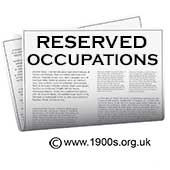
A reserved occupation is an occupation considered important enough to the smooth running of the country for those working in it to be exempt from military service. This page describes the types of occupations considered as reserved in WW2, the types of men involved and the claims for reserved occupation status rather than conscription into the military.
____
By the webmaster, based on informal interviews and family documents
The Oxford Dictionaries Online gives the following definition: A reserved occupation is an occupation from which a person will not be taken for military service.
Occupations treated as reserved in WW2
The list of what counted as reserved occupations in the UK in the Second World War covered a vast range of jobs and was continually updated as the needs of the country changed.
Some occupations, although essential, were excluded from the list because the men in them were needed to serve in the forces and women were deemed able to work in their places. Examples included land girls, bus conductors and factory workers, but there were more.
Mining is an interesting example as coal was an essential commodity. Young miners were so eager to get out of the mines that they actually volunteered for the forces early on in the war. Then there was such a shortage that a proportion of newly conscripted young men were required to serve in the mines instead of the forces. They were known as Bevin Boys.
The highest number of reserved occupations seems to have been in engineering where the work was essential and could only be done by trained and experienced people. My husband's father, for example was a senior engineer in a reserved occupation overseeing the making of lightweight disposable fuel tanks for aircraft.
Hardships of life in a reserved occupation
Men in reserved occupations were no longer in the first flush of youth because by definition they were highly educated and well experienced in their day-jobs. So life was not easy for them because, having done a day's work in their day jobs, they were expected to take their turn fire-watching at night before going off again to their day jobs the next day. They also participated in the Home Guard and the ARP (Air Raid Protection).
contributed by Richard Ouston, recollections
My father was in a reserved occupation and so was required to join the Home Guard. At one stage he was allowed to bring a real live rifle home. I was explicitly forbidden to touch it and it was placed in the back of the wardrobe in my parents' bedroom. Needless to say at the age of probably five or six, this was a toy beyond my wildest dreams and I can remember opening the wardrobe barely daring to touch the rifle but in fact overcoming my fear and holding it. It was probably too heavy for me to lift anyway. Whether or not my father ever knew about this I have no idea but if he did, he probably would have laughed.
Unsuccessful claims for occupations to be treated as reserved
I have understood from talking to people who were alive at the time that there was no shortage of attempts to interpret the list of reserved occupations so as to keep valued employees in post. I have two pieces of hard evidence due to my mother's preoccupation of saving everything. The first is a copy of an attachment to letter from my father's firm making the case that due to his accountancy skills he was indispensible to the firm and should be relieved of active service. The copy makes it clear that it was a claim for my father's occupation to be counted as a reserved one. As was the norm for the time, copies were produced with a manual typewriter on flimsy paper using carbon paper.
Example of a claim for exemption from military service in World War Two
You can either pinch out to view the actual image of the claim or scan down to read its text.
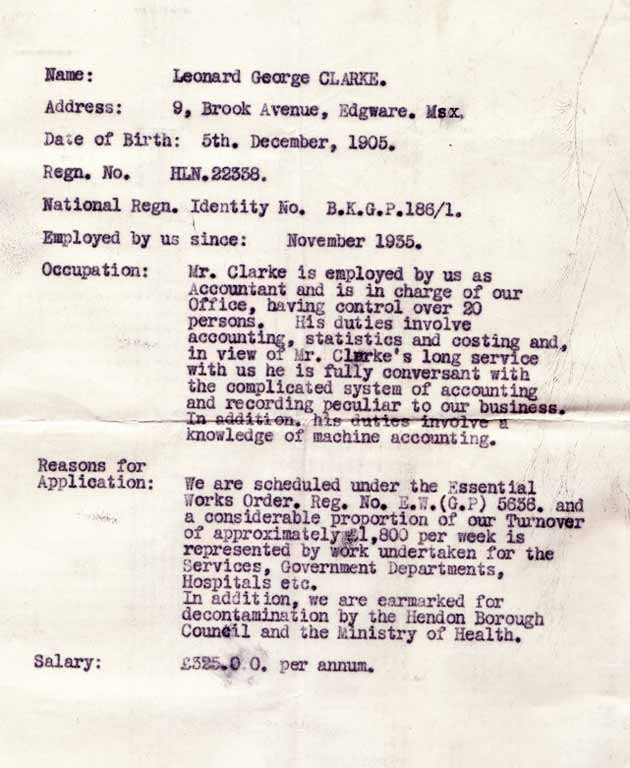
Name: Leonard George CLARKE.
Address: 9, Brook Avenue,
Edgware.Mdx
Date of Birth: 5th. December, 1905.
Regn. No. HLN.22358.
National Regn.
Identity
No. B.N.G.P.166/1.
Employed by us since: November 1935.
Occupation: Mr. Clarke is employed by us as Accountant, and is in charge of our Office, having control over 20 persons. His duties involve accounting, statistics and costing and, in view of Mr. Clarke's long service with us he is fully conversant with the complicated system of accounting and recording, peculiar to our business. In addition, his duties involve a knowledge of machine accounting.
Reasons for Application: We are scheduled under the Essential Works Order. Reg. No. E.W.(G.P) 5636. and a considerable proportion of our Turnover of approximately £80O per week is represented by work undertaken for the Services, Government Departments, Hospitals etc. In addition, we are earmarked for decontamination by the Hendon Borough Council and the Ministry of Health.
Salary: £325.0 0. per annum.
Quite a convincing application, you may think, but it didn't work, in that my father received his papers to serve in the army. Still, though, the firm didn't give up, as the next application shows with a more detailed case lobbying the professional body to intercede.
Request for lobbying to claim exemption from the UK armed forces in World War Two
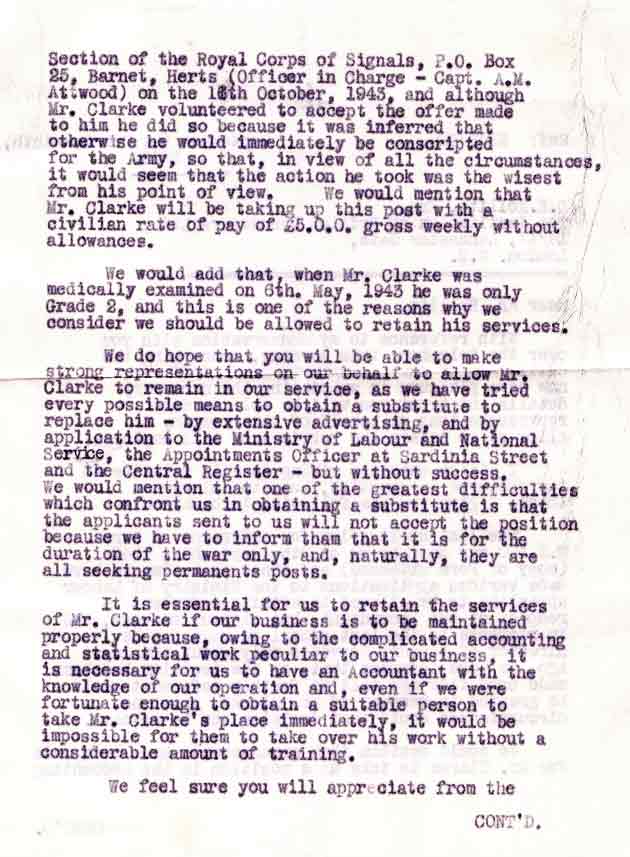
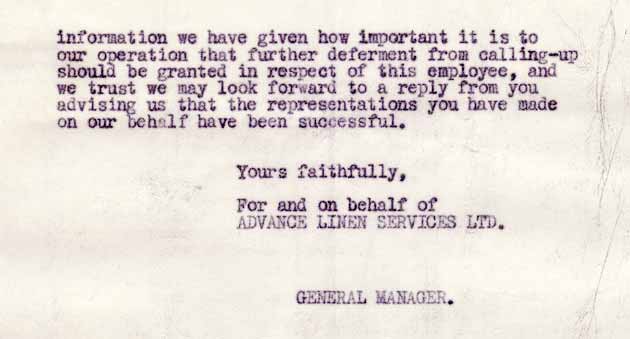
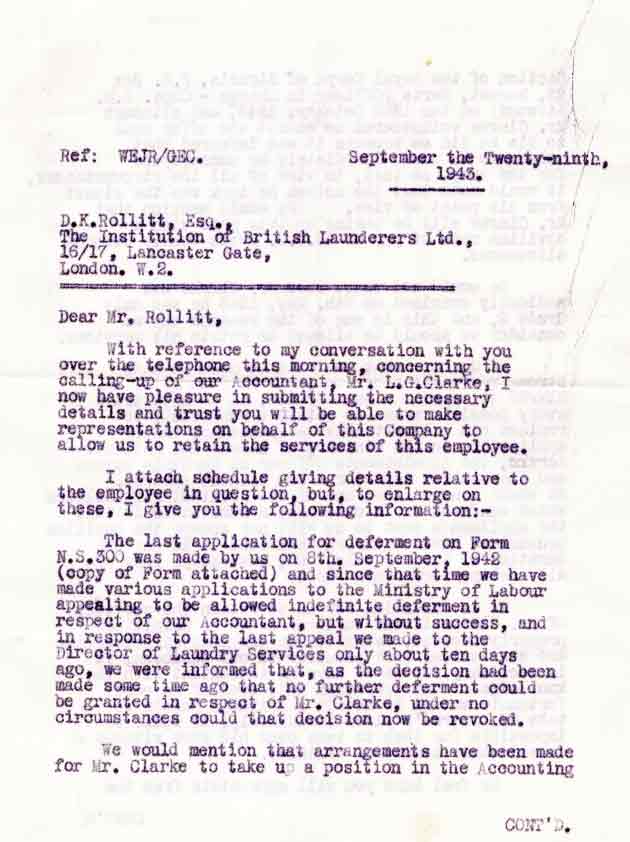
Ref: WRJR/GEG.
September the Twenty-ninth, 1943.
D.K.Rollitt, Esq.
The Institution of British Launderers Ltd
16/17, Lancaster Gate,
London.
W2.
Dear Mr. Rollitt,
With reference to my conversation with you over the telephone this morning, concerning the calling-up of our accountant Mr. L.G.Clarke, I now have pleasure in submitting the necessary details and trust you will be able to make representations on behalf of this Company to allow us to retain the services of this employee.
I attach schedule giving details relative to the employee in question, but, to enlarge on these, I give you the following information:-
The last application for deferment on Form N.S.300 was made by us on 8th September, 1942 (copy of Form attached) and since that time we have made various applications to the Ministry of Labour appealing to be allowed indefinite deferment in respect of our Accountant, but without success, and in response to the last appeal we made to the Director of Laundry Services only about ten days ago, we were informed that, as the decision had been made some time ago that no further deferment could be granted in respect of Mr. Clarke, under no circumstances could that decision now be revoked.
We would mention that arrangements have been made for Clarke to take a position in the Accounting Section of the Royal Corps of Signals, P0. Box 25, Barnet, Harts (Officer in Charge — Capt. A.M. Atwood) on the 16th October, 1942, and although Mr. Clarke volunteered to accept the offer made to him he did so because it was inferred that otherwise he would immediately be conscripted for the Army, so that, in view of all the circumstances, it would seem that the action he took was the wisest from his point of view. We would mention that Mr. Clarke will be taking up this post with a civilian rate of pay of £5.0.0. gross weekly without allowances.
We would add that when Mr. Clarke was medically examined on 6th. May 1943, he was only Grade 2, and this is one of the reasons why we consider we should be allowed to retain his services.
We do hope that you will be able to make strong representation on our behalf to allow Mr. Clarke to remain in our service, as we have tried every possible means to obtain a substitute to replace him — by extensive advertising, and by application to the Ministry of Labour and National Service, the Appointments Officer at Sardinia Street and the Central Register — but without success. We would mention that one of the greatest difficulties which confront us in obtaining a substitute is that the applicants sent to us will not accept the position because we have to inform them that it is for the duration of the war only, and, naturally, they are all seeking permanents posts.
It is essential for us to retain the services of Mr. Clarke if our business is to be maintained properly because, owing to the complicated accounting and statistical work peculiar to our business, it is necessary for us to have an accountant with the knowledge of our operation and, even if we were fortunate enough to obtain a suitable person to take Mr. Clarke's place immediately, it would be impossible for them to take over his work without a considerable amount of training.
We feel sure you will appreciate from the information we have given how important it is to our operation that further deferment from calling-up should be granted in respect of this employee, and we trust we may look forward to a reply from you advising us that the representations you have made on our behalf have been successful.
Yours faithfully,
For and on behalf of
ADVANCE LINEN SERVICES LTD.
GENERAL MANAGER.
None of these pleas worked - as I suspect thousands of others didn't. My father was called up into the Royal Signals with all that that involved, including the full army uniform and a base away from home. His work there was a desk job - accountancy for the rapidly enlarging army. Fortunately for my mother and me, it was within the UK, albeit away from home, and he did get some leaves to visit us.
| sources | webmaster | contact |
Text and images are copyright
If you can add anything to this page or provide a photo, please contact me.



